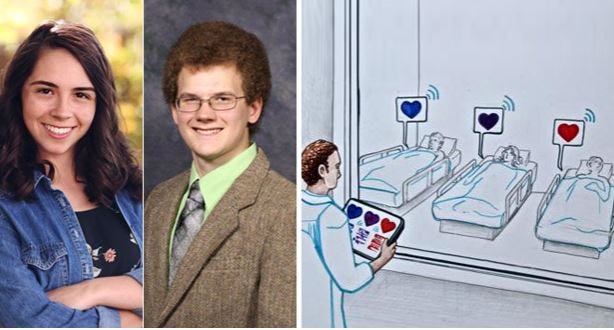Students’ COVID-19 Monitoring Concept Wins International Award
 Archuleta (left) and Keeley (right) designed a system to remotely monitor patients' oxygen saturation.
Archuleta (left) and Keeley (right) designed a system to remotely monitor patients' oxygen saturation.
Subscriber Benefit
As a subscriber you can listen to articles at work, in the car, or while you work out. Subscribe NowA team of Rose-Hulman Institute of Technology students is tweaking their award-winning concept to help address a major challenge related to COVID-19. Originally scheduled for a trip to the Dominican Republic to repair hospital equipment, the students had to pivot in the spring when their travel and classes were cancelled for their Global Engineering for Health course. The change of plans resulted in the team taking one of four grand prizes at an international virtual design competition.
The duo designed a system that addresses a major challenge for healthcare workers in hospitals trying to care for patients with COVID-19. The students’ vision took shape after electrical engineering major Abel Keeley had a conversation early in the pandemic with his sister, an Intensive Care Unit nurse at a hospital in the central New York area.
“She told me about some of the challenges they were facing with how to monitor patients, while trying to keep their distance and prevent the spread [of COVID-19],” says Keeley. “She told me how it was hard trying to make current monitoring processes work with [nurses and doctors] in a physically separate location from the patients.”
Among those current processes—and one of the most critical for COVID-19 patients—are pulse oximeters, the familiar finger clip devices that measure oxygen saturation in the blood. Designing a better way to monitor multiple patients remotely became the focus of their project for a design competition led by UBORA, an open e-platform for innovations that focus on biomedical engineering.
The students’ concept uses the same design as pulse oximeters already common in the market, but “the highlight of the project” is the team’s networking design, says biomedical engineering student Carla Archuleta.
“Being able to network all of this data from several patients to one monitor—that was the point of the project,” says Archuleta. “We created the idea that each patient in the room would have a sensor that would take the oxygen saturation data and convert that data into a digital signal basically. Then, the signal would be processed in some central node or database. This data would be collected and displayed externally on a monitor, [such as a tablet, phone or computer].”
The concept offers the critical benefit that nurses wouldn’t need to be in and out of a hospital room repeatedly, but instead, could remotely monitor multiple patients’ oxygen saturation, reducing caretakers’ exposure to COVID-19, or any other infectious disease.
“I think our design was very unique in the sense that it was low cost and a relatively simple design; it wasn’t complex and intricate, and I think that’s really appealing for development,” says Archuleta. “And there’s really nothing like it out there right now. We did a little research on existing solutions, and we didn’t really find anything that was similar to this, so I think that’s also appealing—it’s unique and different.”
After winning one of four grand prizes at the UBORA competition, which included teams from Europe, Africa and North America, an additional Rose-Hulman student is now helping Keeley and Archuleta prototype the design. Archuleta says computer engineering major Heda Wang is “helping us think of more ideas and make this system come to life.”
Because pulse oximeters are common, and healthcare workers already rely on tablets or computers, the main expense would be networking the data, so the team says the system would be very inexpensive, making it a viable option even in low resource settings. The team plans to continue prototyping the concept and hopes to collect data and test it throughout the school year.
“I’ve always really wanted to help people,” says Keeley, “and this was my first opportunity to get my hands dirty on a project moving toward that. It was tremendously exciting for me.”
“I want to make the most of my abilities as an engineer; I want to be in the field directly helping and working with other people to make devices and designs in the medical device industry,” says Archuleta. “I really see myself being on the front lines, doing the research and design for new devices that are innovative and can help others.”
While the students were supposed to travel to the Dominican Republic to complete their coursework, Archuleta says the virtual competition provided a different kind of “hands-on” experience.
Keeley says the system’s overall design should make the final product inexpensive.
